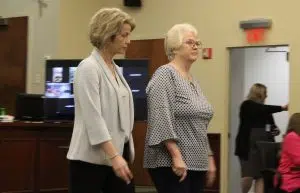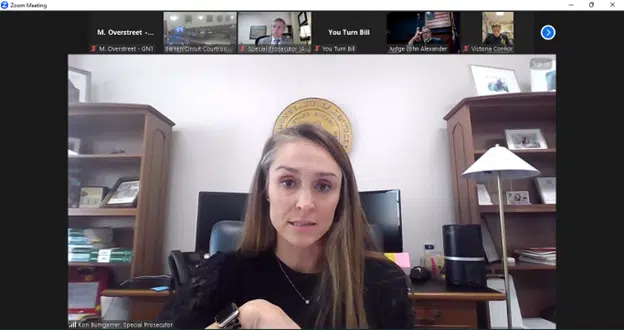By MELINDA J. OVERSTREET
for Glasgow News 1

Cheryl Leighanne Bennett, from left, and her mother, Donna Cheryl Logsdon return to the seating area in Barren Circuit Court after a pretrial conference in their cases. They are accused of killing Michael “Mickey” O. Logsdon, their father and husband, respectively. Glasgow News 1 file photo
The bond for the Glasgow woman accused of being at least partially responsible for the death of her father, Michael “Mickey” O. Logsdon, in July 2022 is getting increased back to its original full amount after a hearing in Barren Circuit Court on Tuesday.
Cheryl Leighanne Bennett and her mother, Donna Cheryl Logsdon, the wife of the deceased, are each facing a count of murder in relation to the death. Bennett had another pending drug-related case from earlier last year, but originally after her arrest on the murder charge, Bennett’s bond was set at $500,000, but it was later reduced for her to only have to actually produce 10 percent of that, and she was on “house arrest” with an ankle monitor, random drug testing and other conditions.
For the third time this year, Bennett had a drug test that came back positive for methamphetamine. The first time, in April, Circuit Judge John T. Alexander had her stay in jail for 30 days before allowing her release. In June, her attorneys and the prosecutors worked out an agreement for her to go to an out-of-state treatment facility, where, according to her testimony Tuesday, she stayed for 10 weeks before returning to Kentucky. A third preliminary test took place Oct. 9, with lab results returned a few days later to confirm the presence of methamphetamine, and she was re-arrested on Oct. 13.
A motion to revoke her current bond was the topic of the revocation hearing, at the conclusion of which Alexander said he believed the commonwealth had met its burden of proof that she had violated the terms of her existing bond, and given the results of the last two times, he was inclined to go along with the prosecution’s suggestion of reverting to the original full $500,000 amount, as opposed to only 10 percent of that.
For and against
The two special prosecutors for Bennett’s respective cases, Eric Finke on the earlier one and Kori Beck Bumgarner for the homicide, attended court via the streaming service Zoom, with Bumgarner taking the lead Tuesday and calling as a witness William Fuller, who also attended via Zoom. Fuller is the owner of U Turn, which manages defendant monitoring and drug testing for the court.
He recounted the process and procedures followed for testing in general and, in particular, on the day of Bennett’s last test, and he explained to varying degrees the types of things that are “red flags” that a person may have tried to interfere with an accurate test result, two of which were present with that test result, and under what circumstances they send the sample on to a lab for further analysis.
Bennett’s defense attorney, John Olash, questioned whether the phrasing of the bond document signed by the defendant included her not using drugs or testing positive for drugs, rather than simply that she had to appear for the testing when requested.
Alexander reviewed the standard wording of the bond form, confirming that the consumption or illegal use of controlled substances constitutes in itself a violation of her bond agreement.
Bumgarner said Bennett has been put on notice each of the previous times her drug tests had come back positive for methamphetamine that she could be jeopardizing her bond.
Olash ticked off several things that had made the past 24 months very difficult for Bennett – the quickly declining health and subsequent death of her father; her own health concerns that include cirrhosis; separation from her husband and decline of her marriage; being arrested and charged with murder; and being in drug rehabilitation – and said the combination of these hardships caused her to make some “poor decisions.”
He said the commonwealth had to show that Bennett was willfully violating her bond conditions.
He also noted the severely addictive nature of methamphetamine and the high incidence of relapse for users who want to get away from the drug. He contended that relinquishing to the temptation of a highly addictive drug doesn’t demonstrate willfulness.
Olash said bonds are not to be used as punitive measure but rather to make sure a defendant shows up in court and to keep the community safe.
He requested that the court consider a 60-day time-out from the last date she was arrested and then her release and said he intended to come to the next pretrial conference, which had been scheduled for Nov. 6, with a specific proposal for her to receive some form of treatment at home.
Alexander said that all of them who work in the criminal justice system understand to some degree the issues they face when it comes to drugs and understand that their abuse and addiction to them are health issues.
“I cannot argue with that; however, another part of that is, the men and women that make all the rules that we’re all obliged to live under, still to a very large degree have decreed that we treat these rules as criminal issues in addition to public health issues, when these criminal statutes are violated or purportedly violated …,” the judge said.
He agreed regarding the purposes of bond that Olash mentioned, but he said the state legislative body had decided that certain drugs are illegal and the use of certain ones is felonious, “and felonies, by definition, my constitute danger either to a person – him- or herself – or to the community.”
With that, he said that checking the box to say the defendant should not use illegal drugs as part of a bond condition but then ignoring it was not an idea he could “rest upon.” If it’s going to be on the form, then failure to comply must have some sort of ramification or consequence, he said, “when it’s proved, as I think it has been in this case, that the condition was not complied with.”
The judge said he understood the argument” Olash put forward about how succumbing to temptation isn’t necessarily a willful act, but “willful” doesn’t necessarily have to be some well-thought-out scheme but simply was it an act done on purpose.
“I’m going to find in this case that the commonwealth has established that there was a willful violation of a bond condition of which the defendant was aware and the consequences of which she was aware,” Alexander said.
He added, however, that he was granting the motion with the understanding that that the possibility exists until a case is finished that the bond could still be modified and he would be open to hearing those arguments presented.
In the midst of the hearing, Alexander said they may not need to meet on the case again as soon as Nov. 6, and a new date of Dec. 4 was agreed upon.



Comments